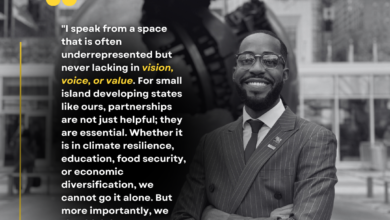This content is provided under the CARICOM Secretariat’s Climate Change and Health Programme (CCHP) supported by the European Union (EU)/CARIFORUM and the Pan American Health Organization (PAHO). The CCHP’s mission is to deepen awareness on how climate change affects health and spread awareness on prevention and adaptation measures to reduce greenhouse gases.

CARICOM Youth Ambassadors (CYAs) are tackling climate change head-on through empowerment, awareness, and engagement as part of the CARICOM Secretariat’s Climate Change and Health Programme (CCHP), supported by the European Union (EU)/CARIFORUM and the Pan American Health Organization (PAHO). The programme’s mission is to deepen awareness of how climate change affects health and spread awareness on prevention and adaptation measures to reduce greenhouse gases.
Research shows that Caribbean youth, like other young people globally, are especially vulnerable to mental health challenges caused by extreme weather events, rising temperatures, displacement, and other climate change impacts. In response to these significant health risks, the CYAs are championing climate change resilience among the Region’s young people and empowering them to cultivate a greener future
Using project activities centred on sustainable waste management and natural resource stewardship, CYAs are educating the Region’s young people about the adverse effects of climate change, both on environmental health and mental well-being, and empowering them with the skills and techniques to address and mitigate the issues in their communities. To date, they have inspired youth in Trinidad and Tobago to view waste differently and use discarded materials to create new business ventures. In St Kitts and Nevis, the CYAs helped young people to start composting bins, leading them to create food sustainability cycles right in their backyards and kitchen gardens. The youth activists began these projects in 2023 and are expected to continue implementation until 2025.
Recycling and upcycling competition turns trash into treasure in Trinidad and Tobago
In Trinidad and Tobago, the Eco Restorers Project educated 18 young people on the benefits and importance of recycling. The project, which was designed as a recycling entrepreneurship incubator, helped the participants learn more about the recycling process, how recycling helps mitigate the effects of climate change, and how to use recycled products to create a business.
The Renew Crew, who won third place in the Eco Restorers Project competition, created a business idea in response to how significantly global honeybee populations have suffered due to climate change. “One in six bee species is regionally extinct,” they stated, adding that “more than 40% [of bees] are vulnerable to extinction.” These alarming statistics inspired them to start their business using upcycled plastic bottles to make portable apiaries (beehives). Group members explained that the apiaries, which address both plastic pollution and the global decline of honeybees, allow them to repurpose plastic waste and provide health-conscious consumers with sustainable, locally produced honey and honey products. Their presentation ended with a powerful call to action: “Together, we can combat plastic pollution and create a sustainable future one beehive at a time!”

Second place winners, TT Eco Warriors, pitched a social enterprise focused on reducing and redirecting waste and empowering communities by teaching women to make jewellery from recycled plastics, glass, metals, and fabric scraps. The group noted that plastic, in its many forms, makes up 90% of the solid waste entering landfills. Their presentation also highlighted plastic’s harmful effects on marine life and its contribution to regional and global flooding. In response, the Eco Warriors’ business idea focused on the triple impact of upcycling scraps to create fashionable, unique accessories, lessening the waste going to landfills, and empowering women through job creation.
Women for Waste Reduction captured first place with their proposal to upcycle wine and liquor bottles and use them to make stylish, customisable drinking glasses. Powered by their mission to “reduce glass waste and promote a sustainable economy”, the group created their project to provide eco-shoppers, unique gift retailers, and collectors with beautiful, sustainable glassware. The competition judges gave them high marks for their business idea, including their plans to increase product offerings in the future and create larger glass items such as serving dishes and light fixtures.

Youth in St Kitts and Nevis learn the power of composting
Eleven young people learned to compost in St Kitts and Nevis through the CYA initiative. The CYAs’ overall goal was to educate young people on the many benefits of composting, including reducing greenhouse gasses, reducing soil erosion, promoting drought resistance, and increasing the soil’s water and nutrient retention. The project was especially relevant given the Federation’s current soil erosion and flooding issues, a direct consequence of global climate change and rising sea levels. Through their participation, local youth were able to play an integral role in addressing the problem.
For over six (6) months, participants cultivated compost piles with the help of the project’s technical expert. They carefully tended to the piles, monitoring their temperature and moisture levels and ensuring ideal conditions necessary for compost processing. Throughout the process, the participants learned the importance of composting and how to grow and maintain a compost pile sustainably and effectively.

This cyclical project allowed participants to contribute to and benefit from the compost. Using scraps and biodegradable materials from their homes, participants gradually increased their compost piles. They then used the composted material as nutrient-rich, organic fertiliser for their kitchen gardens, creating sustainable mini ecosystems that they and their families can develop and use for years to come.
CARICOM Youth Ambassadors to continue to build resilience and effect change
These projects are integral to the overall CCHP mission. Future initiatives will educate regional youth on the importance of local wetlands, introduce them to home and school gardening, help them build and sustain community green spaces, and allow them to get involved in more aspects of local, regional, and international climate change and health advocacy.
Climate researchers have long touted the positive influence of intergenerational solidarity on policies and social services that address the effects of climate change. By fostering youth engagement, the CYAs—with the continued support of the CARICOM Secretariat and PAHO—will undoubtedly create lasting, progressive environmental and health impacts for their communities, the Region, and the world.





